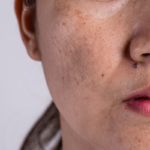When it comes to achieving healthy, glowing skin, we often focus on external factors such as skin care routines, diet, and environmental conditions. However, one vital aspect that is often overlooked is mental well-being.
Our mental health has a profound impact on various aspects of our lives, including our physical well-being, and this extends to our skin complexion.
In this article, we will explore five ways in which mental well-being affects your skin complexion, backed by scientific research and real-life examples.
1. Stress and Breakouts

Stress is a common factor in our modern lives, and it can wreak havoc on our skin. When we experience stress, our body releases hormones such as cortisol, which triggers an increase in oil production.
This excess oil, combined with inflammation, can clog pores and lead to breakouts. In addition, stress compromises the skin’s barrier function, making it more susceptible to external irritants.
For example, a study published in the Archives of Dermatology found that students who experienced higher levels of stress during examination periods had more severe acne compared to non-exam periods.
To manage stress-related breakouts, it is essential to practice stress-reducing techniques such as exercise, meditation, and deep breathing exercises.
Additionally, incorporating skincare products with ingredients like salicylic acid and niacinamide can help combat acne and inflammation.
2. Lack of Sleep and Dullness

A good night’s sleep is crucial for overall well-being, and it significantly impacts our skin complexion. During sleep, our body repairs itself, including the regeneration of skin cells.
Insufficient sleep can disrupt this process, leading to a dull and lackluster complexion. Moreover, inadequate sleep affects the body’s circulation, resulting in reduced oxygen and nutrient supply to the skin.
Research conducted at the University Hospitals Case Medical Center in Ohio revealed that poor sleep quality was associated with increased signs of skin aging, uneven skin tone, and reduced skin elasticity.
To promote better sleep and combat dullness, establish a consistent sleep routine, create a sleep-friendly environment, and practice relaxation techniques before bed.
Additionally, using skincare products enriched with antioxidants and hydrating ingredients can help revive a tired complexion.
3. Anxiety and Skin Sensitivity

Anxiety disorders can manifest in various ways, and one common symptom is heightened skin sensitivity. When we are anxious or stressed, our body releases stress hormones, which can trigger or exacerbate skin conditions such as eczema, psoriasis, and rosacea.
Furthermore, anxiety can lead to habits like excessive touching, picking, or scratching the skin, further aggravating existing skin conditions. A study published in the British Journal of Dermatology found a significant association between anxiety and increased severity of eczema symptoms.
Read: Does Collagen Help Eczema? Best Supplement for Eczema
To manage anxiety-related skin sensitivity, it is crucial to practice stress reduction techniques such as therapy, mindfulness, and self-care activities.
Besides, using gentle skincare products formulated for sensitive skin and avoiding triggers like harsh chemicals or fragrances can help soothe and protect the skin.
4. Depression and Slowed Healing

Depression is a complex mental health condition that affects millions of people worldwide. Beyond its emotional toll, depression can also impact physical healing processes.
The production of collagen, a key protein responsible for skin elasticity and wound healing, may be reduced in individuals with depression.
Depression can lead to poor self-care habits, including neglecting skincare routines, unhealthy diet, and lack of exercise, all of which can contribute to compromised skin health.
A study published in the journal General Hospital Psychiatry found that patients with depression had significantly delayed wound healing compared to non-depressed individuals.
Seeking professional help, engaging in therapy, and adopting healthy lifestyle habits are essential in managing depression and promoting optimal skin healing. Incorporating skincare products with ingredients like vitamin C, retinol, and hyaluronic acid can also support collagen production and overall skin health.
5. Positive Outlook and Radiant Skin

On a positive note, maintaining good mental well-being can lead to a radiant complexion. When we experience positive emotions, our body releases endorphins and other feel-good hormones that enhance blood circulation and promote a healthy glow.
Individuals with a positive mindset are more likely to adopt self-care practices, including a consistent skincare routine, which contributes to healthier skin. Cultivating a positive outlook through activities such as gratitude journaling, pursuing hobbies, and connecting with loved ones can positively impact your mental well-being and, in turn, your skin complexion.
Using skincare products infused with antioxidants, such as vitamins A, C, and E, can also help protect the skin from environmental stressors and boost its natural radiance.
Read: Ayurvedic Skincare: How to Harness Ancient Wisdom for Healthy Skin
Conclusion
The connection between mental well-being and skin complexion is a fascinating area of research that highlights the importance of holistic health.
By prioritizing mental well-being through stress management techniques, quality sleep, and seeking professional help when needed, we can positively impact our skin’s appearance.
Remember, taking care of your mind is just as crucial as taking care of your skin when it comes to achieving a healthy and radiant complexion.
Disclaimer: This article is for informational purposes only and should not replace professional medical advice. If you are experiencing severe mental health issues or skin conditions, please consult a healthcare professional.




